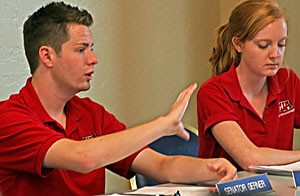Two bylaw changes were approved last night in the ASUA Senate meeting.
The first, written by Sen. Shawn Ingram, a finance junior, and sponsored by Sen. Bryan Hill, an economics senior, dealt with the ongoing debate about senate involvement with the Appropriations Board and also reformatted all of the Associated Students of the University of Arizona bylaws because of errors in numbering and organization.
In January, one of the bylaws was amended, giving the senate the power to change the amount of funds a club would receive after the Appropriations Board had already voted on it. To do this, the senate had to first send the amount back to the Appropriations Board for reconsideration.
Ingram strongly opposed this change and had been fighting for it to be reversed throughout the semester.
“”These are the exact same bylaws as before, but they are reformatted to be more consistent,”” Ingram said. “”And they reverse the prior Appropriations Board change.””
Sen. Steven Gerner, a political science senior, proposed the bylaw change that passed in January and was opposed to the reversal voted on last night along with a few other senators.
“”I really commend (Ingram) for taking this initiative,”” Gerner said. “”But I do think there were problems with the way the bylaw used to be, so I don’t support this bylaw change.””
Said Sen. Samantha Kerr, a pre-health education senior: “”I think it’s the prerogative of the new senate to change this bylaw if they want, so I am not in support of this change either.””
The bylaw changes ultimately passed with a two-thirds vote.
The second bylaw change proposed and passed last night established guidelines for senate proxy voting and was written and proposed by Sen. Brad Burns, a political science junior.
The bylaw change gives direct rules for when proxy votes can and cannot be used. One of the main guidelines keeps proxy votes from being used on items that were not expected before the senate meeting.
Proxy votes are used when a senator is unable to attend a senate meeting but still wants his or her opinion to be heard. They can choose a senator to “”carry”” their votes, or vote for them in the way they tell them to.
Gerner said he would like to see a section that gives those senators who were absent but gave another senator a proxy a certain amount of time to reconsider and change their vote if they were not happy with it.
“”I think that would be pretty ridiculous, because someone could just be persuaded after the meeting,”” Ingram said. “”I think this bylaw change is great the way it is.””
The bylaw change passed unanimously.









